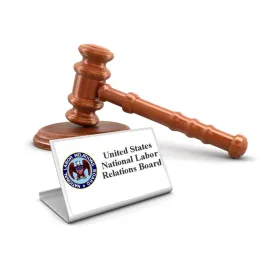In a ruling that will impact both union and non-union employees, the National Labor Relations Board (“NLRB”) held that standard non-disparagement and confidentiality provisions contained in a severance agreement were invalid and that the mere proffer of the agreement containing the terms was an unfair labor practice.
In McLaren Macomb, 372 NLRB No. 58 (Feb. 2, 2023) the employer permanently furloughed 11 employees in response to COVID quarantine limitations. Each furloughed employee was offered a severance and release agreement that contained a non-disparagement clause and a confidentiality clause. The latter required employees not to reveal the existence of the agreement or the amount paid to third parties other than family, accountants, or in response to a subpoena. The non-disparagement clause barred the sharing of employer confidential information with any third party and prohibited “mak[ing] statements to Employer’s employees or to the general public which could disparage or harm the image of Employer, [or its affiliates].” All 11 employees signed the agreement and accepted the payments thereunder.
The NLRB held that each of the clauses constituted an unlawful mandatory waiver of the employees’ protected rights to engage in concerted activity regarding their terms and conditions of employment. For example, the confidentiality provision would prohibit employees from discussing the severance terms with other employees offered a package. The non-disparagement provision was found likely to inhibit potential future organizing or bargaining efforts. As a result, the NLRB held that the likely chilling effect on employee rights made the employer’s mere offer of the agreement an unlawful threat to the employees’ rights under the National Labor Relations Act (“the Act”). While the case involved findings of other unfair practices in connection with the lay-off and severance agreement, the NLRB majority stressed that merely offering the agreement was itself an unfair labor practice. This holding overrules prior Board precedent which found such provisions in severance agreements lawful to the extent they were entered into voluntarily and in a context free of other unlawful or coercive behavior.
The NLRB’s decision will likely have broad and significant impacts on the enforceability of severance and release agreements. Under the Act, virtually all employees other than those who directly supervise others have the same rights to concerted activity as do the unionized employees involved in the McLaren case.
Employers should review their severance and release agreements to ensure compliance with the latest Board ruling.






 />i
/>i

